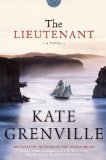Summary | Excerpt | Reading Guide | Reviews | Beyond the Book | Read-Alikes | Genres & Themes | Author Bio

Critics' Opinion:
Readers' Opinion:
First Published:
Sep 2009, 320 pages
Paperback:
Sep 2010, 320 pages
 Book Reviewed by:
Book Reviewed by:
BookBrowse First Impression Reviewers
Buy This Book
This article relates to The Lieutenant
You might wonder why Britain would choose to send ships filled with convicts
and their jailors to, quite literally, the other side of the world. The
answer is simple economics.
In the 1780s, the British population was increasing fast, as were the effects of
the Industrial Revolution which led to the displacement of a great many people who, without land, rights or jobs, were reduced to stealing.
Meanwhile, Britain, having lost the American Colonies, was on the lookout for
new land to colonize. The east coast of Australia, charted by The
Endeavor in 1770, looked like it had potential. So it was decided
that instead of using slaves, the infrastructure of the new colony would be
built with convict labor - a free and often skilled work force that also
went some way to solving the British convict problem.
 On the whole, the convicts sent to Australia were not hardened criminals. About eight out of ten had been convicted for stealing, one in three were Irish and almost without exception they were poor. Most were
sentenced for seven to fourteen years of penal servitude; others were to serve
"for the term of their natural lives" - the latter having been commuted from the
death sentence. By the 1770s there were over two hundred crimes in Britain that could result in the death penalty, including stealing anything worth more than 5 shillings (which is about £28 or US $40 in today's money according to this nifty historical inflation calculator).
On the whole, the convicts sent to Australia were not hardened criminals. About eight out of ten had been convicted for stealing, one in three were Irish and almost without exception they were poor. Most were
sentenced for seven to fourteen years of penal servitude; others were to serve
"for the term of their natural lives" - the latter having been commuted from the
death sentence. By the 1770s there were over two hundred crimes in Britain that could result in the death penalty, including stealing anything worth more than 5 shillings (which is about £28 or US $40 in today's money according to this nifty historical inflation calculator).
In 1787, the First Fleet of eleven ships arrived in Port Jackson (now part of
Sydney Harbour). It is thought that 1,403 embarked from Portsmouth Harbour in England; 1,332 arrived. During the voyage 69 people either died, were discharged or deserted and seven were born. Of those that arrived, about 732 were convicts, 514 were crew and marines, 54 were the wives and children of marines, about 14 were officials or passengers, and just 18 were children belonging to convicts, 4 of whom were born during the voyage. Two more convict fleets arrived in 1790 and 1791, and the first free settlers arrived in
1793.
Tradesmen were highly valued and assigned to tasks that fitted their skills, while the unskilled were assigned to work gangs. Many convicts were assigned directly to free settlers who were responsible for them, thus reducing the burden on the fledgling administration. The majority of women (representing 20% of convicts) were assigned as servants, in the early days to marines and later to free settlers, with many being forced into prostitution. Other women, especially new arrivals and those who were pregnant or being punished, were assigned to "female factories" (prison work houses). Having completed their sentence the convicts were freed with parcels of land allocated to them and were able to take on convict servants themselves.
165,000 convicts would arrive in Australia between 1788-1868, mostly to Port Jackson; with some, after 1850, being transported to Western Australia.
Of course, it should not be forgotten that in 1787, when the first convict ships
arrived, Australia was already home to an estimated 318,000-750,000 indigenous
people (with over 250 spoken languages and 600 dialects), the majority of whom
lived in south-east Australia - the same attractive part of the country to which
the early settlers arrived.
Links
Filed under Places, Cultures & Identities
![]() This "beyond the book article" relates to The Lieutenant. It originally ran in October 2009 and has been updated for the
September 2010 paperback edition.
Go to magazine.
This "beyond the book article" relates to The Lieutenant. It originally ran in October 2009 and has been updated for the
September 2010 paperback edition.
Go to magazine.





The House on Biscayne Bay
by Chanel Cleeton
As death stalks a gothic mansion in Miami, the lives of two women intertwine as the past and present collide.

The Flower Sisters
by Michelle Collins Anderson
From the new Fannie Flagg of the Ozarks, a richly-woven story of family, forgiveness, and reinvention.

The Funeral Cryer by Wenyan Lu
Debut novelist Wenyan Lu brings us this witty yet profound story about one woman's midlife reawakening in contemporary rural China.
Your guide toexceptional books
BookBrowse seeks out and recommends the best in contemporary fiction and nonfiction—books that not only engage and entertain but also deepen our understanding of ourselves and the world around us.